Navigating the path of parenting can be challenging, especially when your child has Autism Spectrum Disorder (ASD). Each day brings unique struggles and triumphs. This article is designed to be your guide on how to handle common challenges of parenting a child with autism. We’ll delve into practical strategies, effective coping mechanisms, and explore resources that can help you and your child thrive. So whether you are a new parent or a seasoned one, this article will offer valuable insights for everyone in the autism community.
“Understanding the Unique Challenges of Raising an Autistic Child”

Raising a child with autism presents unique challenges that require patience, understanding, and specific strategies. Parents must navigate the complexities of autism spectrum disorder (ASD), which can include communication difficulties, social interaction struggles, and repetitive behaviors. They often grapple with educational system navigation, helping their child develop social skills, and managing sensory sensitivities. Understanding these hurdles is the first step towards effective parenting strategies for a child with autism. This blog aims to provide insights into these challenges and offer practical guidance for parents, helping them foster their child’s strengths while addressing their needs. By understanding autism and its associated challenges, parents can create a supportive and nurturing environment for their child.
“Effective Strategies for Coping with Autism-Related Behavioral Issues”

Managing autism-related behavioral issues can be quite challenging for parents. However, with the right strategies, these challenges can be handled effectively. Firstly, it’s crucial to create a consistent and predictable environment for your child, which can significantly reduce their anxiety and behavioral problems. Secondly, using visual aids can help your child understand instructions better. Thirdly, positive reinforcement is key. Emphasize on rewarding good behavior rather than punishing the bad. Lastly, consider seeking professional help such as ABA (Applied Behavior Analysis) therapy, known to be highly effective in managing behavioral issues in children with autism. Remember, patience and understanding are your biggest allies in this journey.
“Navigating Social Challenges: Autism and Peer Interactions”
One of the most significant challenges for parents of children with autism is navigating social interactions, particularly with peers. Autistic children often struggle with social cues, which can lead to difficulties in making friends and participating in group activities. To address these challenges, it’s crucial to teach them social skills in a way they can understand and apply. For example, using social stories or role-playing scenarios can help them comprehend different social situations. Additionally, fostering a supportive environment where they feel comfortable expressing their feelings can significantly improve their social interactions. Remember, patience, understanding, and consistent practice are key to helping your child navigate the complex world of social relationships.
“Addressing Communication Barriers in Children with Autism”

Overcoming communication barriers in children with Autism can be one of the most challenging aspects of parenting. With Autism Spectrum Disorder (ASD), kids may struggle with both verbal and non-verbal communication, making it difficult for them to express their feelings or understand others. To support your child effectively, it’s essential to utilize autism-specific communication strategies. These techniques might include speech-language therapy, social stories, visual aids, or assistive technology. Nurturing a communicative environment that respects your child’s unique needs can foster their social skills, enhance their understanding, and ultimately improve their quality of life. Understanding these strategies and implementing them consistently can make a significant difference in your child’s life.
“Supporting Educational Needs: How to Advocate for Your Autistic Child in School”
Navigating the educational system for your child with autism can be a demanding task. However, understanding how to advocate for your child’s needs effectively is crucial. Parents should familiarize themselves with their child’s educational rights, Individualized Education Program (IEP), and other relevant special education services. Regular communication with the school staff and therapists can help in tracking your child’s progress and addressing any concerns promptly. Also, engaging in parent-teacher meetings and being proactive in seeking necessary accommodations can significantly enhance your child’s learning experience. Remember, your involvement is key to ensuring your child’s academic success and overall well-being.




